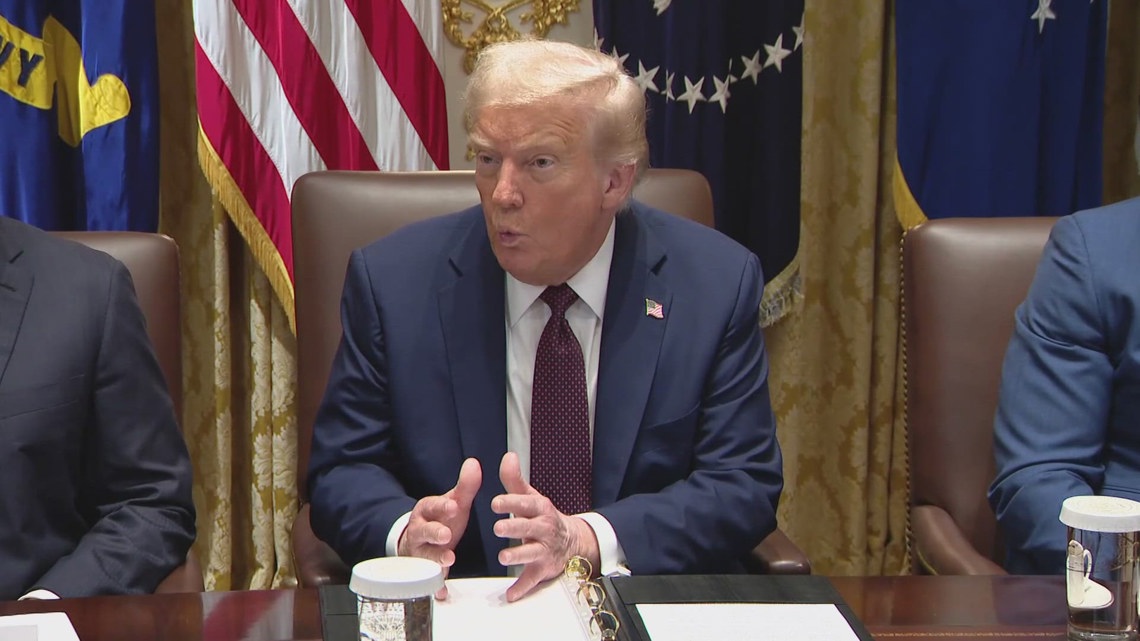Nathalie Rose Jones, 49, of New York, was arrested in August for allegedly making repeated threats toward President Donald Trump online.
WASHINGTON — A grand jury has refused charges against a New York woman accused of threatening President Donald Trump, her attorney said in a court filing Monday.
D.C. District Court Chief Judge Jeb Boasberg released 49-year-old Nathalie Rose Jones last week to GPS monitoring over the objection of prosecutors, who argued she’d made violent threats toward Trump. Boasberg overturned a ruling by a magistrate judge who’d ordered Jones detained following her arrest in D.C. last month.
On Monday, Jones’ attorney, assistant federal public defender Mary Petras, asked Boasberg to remove her remaining release conditions – saying a grand jury in D.C. had declined to indict her.
“A grand jury has now found no probable cause to indict Ms. Jones on the charged offenses,” Petras wrote. “Given that finding, the weight of the evidence is weak. The government may intend to try again to obtain an indictment, but the evidence has not changed and no indictment is likely.”
Grand juries nearly always return indictments in federal cases because they are tasked with deciding only whether there is a reasonable basis to support charging a crime, a much lower burden than in criminal trials, and because they typically made their decisions after hearing evidence only from the government. Under federal law, an indictment is required within 30 days of arrest for any felony charge prosecutors want to bring.
Jones, who previously worked as a pharmacist in Indiana, came to federal investigators’ attention in early August when she allegedly began posting threatening messages toward Trump online. In a Facebook post on Aug. 6 in which she tagged the FBI, Jones wrote she was “willing to sacrificially kill this POTUS by disemboweling him and cutting out his trachea.” In an email sent Aug. 14, Jones allegedly wrote she was “available to kill this man” in apparent reference to Trump. According to a detention memo, the email was sent to “several military, pharmaceutical and governmental recipients.”
Jones’ posts drew a visit to her New York apartment by U.S. Secret Service agents, who questioned her but did not arrest her. Federal agents arrested Jones a day later after she traveled to D.C. to attend a protest.
A magistrate judge said she didn’t think Jones’ statements were hyperbole, but Boasberg disagreed. He said they appeared to be the “rantings” of someone with mental illness but no ability to actually carry them out. He also said USSS had apparently not been concerned enough to dissuade Jones from coming to D.C., even though she told them she planned to.
“Doesn’t that kind of suggest they didn’t take those threats seriously?” Boasberg said.
U.S. Attorney Jeanine Pirro’s office has run into repeated difficulties in obtaining grand jury indictments since Trump’s federal surge in D.C. began. Last week, prosecutors were forced to acknowledged they had tried three times to indict a woman for allegedly assaulting an FBI agent and been rejected all three times. A day later, WUSA9 reported a grand jury had refused to indict a D.C. man accused of assaulting a Customs and Border Protection officer by throwing a sandwich at him. Prosecutors have since charged both defendants with lesser misdemeanors.
Under Justice Department policy, prosecutors could attempt to reindict Jones if Pirro signs off on it. Or, they could file a criminal information to charge her with a misdemeanor.

